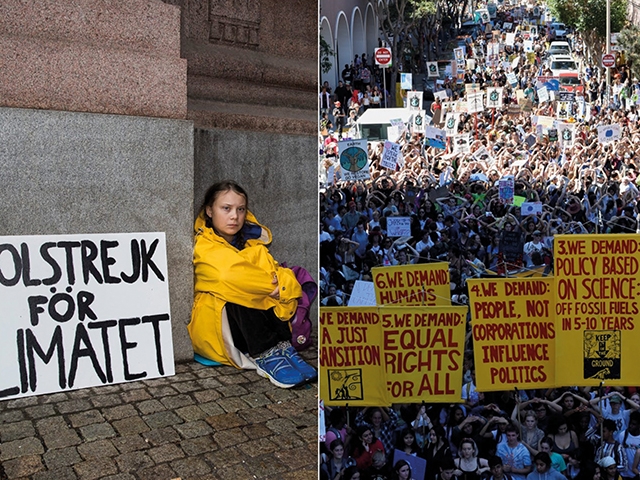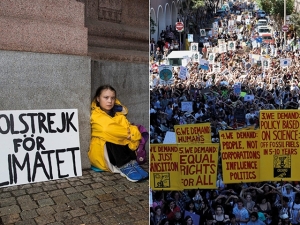Why I Strike for the Climate
BLOG
It’s been over a year now that 16-year-old Greta Thunberg took time off school to demonstrate outside the Swedish parliament, holding up a sign calling for stronger climate action. Her sitting alone for a few weeks finally resulted in inspiring youth to follow her example and then together organize a school climate strike movement under the name ‘Fridays for the Future.’ Their message is easy to understand: “What is there to study for if mine and the world’s existence are in danger?” The slogan is used by thousands of students who strike every Friday, [since August 2018 when Greta started the movement]. March 15 marked the first date of a global strike, which was joined by over 2 million young people.
20-27 September is when the world, led by youth, came together as one again, also seeing the International Labor Organization on board with the strikes. The demand again was not complicated: it is time for action!
This is where I finish talking about Greta and the Western movement for climate change, because, yes, at first glance, this movement is Western. It found its roots in one of the most developed countries, Sweden, and the majority of the youth who strike are from Europe. But still, despite all this, plenty of young people from the global South and Georgia have become a part of the movement. Why?
First of all, of course, the simplest answer is that the climate crisis knows and has no borders. Borders are no barricades for transnational corporations: they can cross any border easily and start up their business anywhere, whatever the continent. This ‘business’ means putting the country’s full resources (human as much as natural) to work- exploitation. I’d also like to note, that it is exactly these transnational corporations who are the main ones at fault for the climate crisis: they overproduce and propagate consumerism so they can sell more and more. We can sum up their work using a well-known quote: “water companies produce plastic bottles, not water.”
Within them, 100 oil-extracting companies deserve the ‘special mentions’ category. These companies are responsible for over 71% of gas pollution. This pollution plays the main role in climate change. At the same time, we see “green lifestyle” becoming more of a trend, a lifestyle includes limiting the use of plastic, becoming vegan, etc. These trends, of course, are very good and the more of us that choose that lifestyle, the better, but there lies a big problem. It is brought to us in such a way as to make us think that we can individually fix the damage we have caused this planet. It’s a problem because simply put, it’s just a lie. It is especially untrue in the case of “developing countries,” like Georgia and the global South, because in these “resident individuals of poor countries have little to no control over climate change.”
Getting back to the corporations, in 1972 at the UN General Assembly, the socialist President of Chile, Salvador Allende, said during his famous speech: “We are faced by a confrontation between the large transnational corporations and the states. The corporations are interfering in the fundamental political, economic and military decisions of the states. The corporations are global organizations that do not depend on any state and whose activities are not controlled by, nor are they accountable to, any parliament or any other institution representative of the collective interest. In short, the global political structure is being undermined. The dealers don't have a country. The place they may be does not constitute any kind of link; the only thing they are interested in is where they can make a profit.” A year after he made that speech, President Allende, who was elected rather democratically, was turned out by a military coup. Socialist Allende was replaced by fascist military dictator Augusto Pinochet. The former is associated with many thousands of incidents of human torture, imprisonment, and murder. What’s more, during his rule, campaigns for privatization, deregulation, and neo-liberalism took place. Allende’s nationalized industries and those belonging to the state, banks and other resources were sold. The abovementioned was not the first and certainly not the last to serve as a sacrifice for transnational corporations’ interests.
I have already mentioned neoliberalism. This is the term that you will hear plenty of times from us, the young greens, and from the left-wingers of Georgia, and not only when describing political or economic systems. To sum it up really quickly, I’ll take a few words from David Harvey: “Neoliberalism, above all, is a political theory about economic practices which tells us that human well-being can be accomplished by individual entrepreneurial freedom within the institutional frames that strengthen the free market and free trading system to ensure strong rights for private property. The state’s role is to create necessary institutionary frames for these practices and to protect them.”
The leader of the Conservative Party from 1975 to 1990, Margaret Thatcher, became the Prime Minister of the United Kingdom in 1979. The republican Ronald Reagan was elected in 1981. Ever since that period, neoliberalism has started to slowly transform into a hegemonic ideology. Dominated by the USA, global financial institutes, the World Bank and International Exchange Fund, turned neoliberalism into a global political-economic system. They started implementing this newly founded system in the so-called developing countries, naming deregulation, privatization and market liberalization as the only right economic practice.
This is exactly the system that grew strong roots in independent Georgia. During the last 30 years neoliberalism has become the ruling political-economic ideology. This is especially true when talking about Georgia from 2003 to present, as it was the year when the United National Movement started governing the country. Saakashvili’s government followed the steps and directions of becoming a neoliberal state: deregulation, privatization, a strong police system, fetishizing private property, anti-social politics, etc. The abovementioned political direction was more evident than ever when Bendukidze served as the Minister of Economy – “everything is for sale except conscience,” he used to say. He aimed to close down his ministry [the Ministry of Economy] and cancel all the economic regulations imposed by the government.
Not to ramble on much longer, you might ask here, how all these things connect- neo-liberalism, Chile, Thatcher, the United National Movement, and the climate crisis… However, the climate crisis has a very specific guilty party and that is the abovementioned political-economic system: capitalism. Capitalism sees everything as a matter of 'buy-sell' and condemns the government having a say in the economy and civilians protecting the environment as “an offense to the right to freedom.” We owe the current order of the world to this ideology and here is the ‘current order:’Western corporations stand above the institution of the state, the former having more power and consequently, numerous countries have become their colonies.
The same ideology is responsible for imposing regulations or the removal of government control of the environment, which, of course, causes lots of ecological problems. To follow up with the example of Georgia, these neoliberal and antidemocratic variations demanded tons of sacrifice – devastating the country’s potential to develop environment and resources sustainably. The complete deregulation of environmental protection has taken place. Ecological expertise of mining operations, a field endangering the environment, has been completely left aside. Finally, in 2011 the natural resources-related functions of the Ministry of Environment and Natural Resources Protection of Georgia were passed to the Ministry of Energy and the different functions of protecting the environment were disseminated to different parts of government agencies. Environmental protection as a field has been completely lost; a fact then topped off with numerous inadequate decisions. So, when speaking about environmental problems in Georgia and around the globe, we have to keep in mind that behind those problems is one very specific reason, and that is the political-economic structure.
To sum up quickly and get back to the environmental strike, it has to be said that too many eco-activists make a big mistake when they only talk about ecology, Co2, and other merely technical/scientific issues. This results in ‘depoliticization’ of climate change and that is fundamentally wrong, as the root of the problem is political and unless we change it, there will be no real progress.
We are not under the illusion that a “better climate” can exist in the current political-economic system. This is because the existing economic models are deeply dependent on human and natural resource exploitation, and this transnational and capitalist system eliminates the possibility for a “better climate”. Unless the order changes, the existence of planet Earth and humanity has a big question mark over it.
There is one more crucial aspect that has to be taken into account. The climate crisis won’t affect everyone equally: it has a class system and political-geographical layers. We, the “developing” countries which are placed on the peripheral parts of the world and which are poor- economically and politically dependent on the “better-off” countries, will be the ones to first feel the tragedies of climate change when it reaches its peak. Not the “developed” countries, where the environmental movement is at its highest.
Correspondingly, we, the Young Greens and other left-winger greens, believe that the West, also known as the global north, has to take the responsibility for suspending the climate change. The latter is impossible unless the order of the world changes, the fortune is redistributed, the economy is decentralized and so, the hegemony of global north ends. The idea is supported by Wolfgang Sachs in his writings of sustainable development.
This is why it’s crucial to fight for climate justice even in the South where we do not have the authority to stop it. But we do have the power to demand that our government consider the collective interest of its civilians and resist local or international corporations that stand against that will. As Sachs put it, building a good global neighborhood demands interior reforms which have cosmopolitical interests at heart.
Unfortunately, the exact opposite of the above is taking place in Georgia. In our country, we are witnessing how the government has been the main supporter of corporations, turning its back on its community for decades now. Our government follows the economic policy written out by the world finance institutes, which makes the people of Georgia poorer and destroys nature.
In global terms, Georgia does not pollute the environment but locally, the country has numerous socio-ecological problems. The current liberal ‘attracting investors’ politics invites transnational companies to use Georgia’s territories for manufacture, allowing them to build environmentally polluting factories here. Undoubtedly, the latter will have fatal consequences locally and regionally.
The fight does not begin on an empty page, because it has been going on for a while regarding the Svaneti, Pankisi and other hydroelectric stations. We need to expand, connect these little resistances of ours, strengthen them and carry on. The real fight is for the betterment of social well-being, protecting people’s common interests against further enrichment of the economic elite. This fight is local as much as it is global, that is why only coming together as one and solidarity can take us to a new world with a new order.
I strike, because the climate crisis and domination of the economic elite have no borders; because it is time to build a world fit for all and not for individuals. And last but not least, I strike because we have no other option: We need to finish capitalism before it finishes us.
By Giorgi Ptskialadze, MEMBER OF THE GEORGIAN YOUNG GREENS
Image source: Left: Greta Thunberg sits outside the Swedish parliament building in order to raises awareness for climate change on August 28, 2018 in Stockholm, Sweden. Right: People protest during a Climate Strike march in San Francisco, California, September 20, 2019. MICHAEL CAMPANELLA/Getty Images and REUTERS/Kate Munsch











